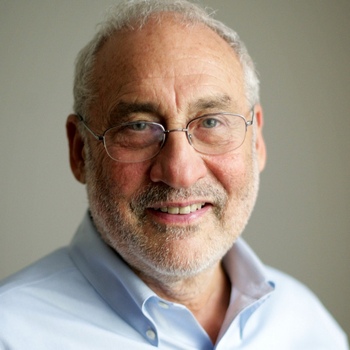DOCTOR OF COMMERCE (HONORIS CAUSA)
 Joseph Eugene Stiglitz was born from Jewish parents on 9 February 1943 in the small American port city of Gary, on Lake Michigan. He completed his undergraduate studies at Amherst College and completed his PhD in Economics at the famous Massachusetts Institute of Technology in 1967 before he moved to the University of Cambridge as a Fulbright research fellow. He also holds MA degrees from Cambridge (1970) and Oxford (1976). His distinguished academic career took him to top universities such as Yale, Duke, Stanford, Oxford and Princeton, before he assumed his current position as professor of Economics at Colombia University.
Joseph Eugene Stiglitz was born from Jewish parents on 9 February 1943 in the small American port city of Gary, on Lake Michigan. He completed his undergraduate studies at Amherst College and completed his PhD in Economics at the famous Massachusetts Institute of Technology in 1967 before he moved to the University of Cambridge as a Fulbright research fellow. He also holds MA degrees from Cambridge (1970) and Oxford (1976). His distinguished academic career took him to top universities such as Yale, Duke, Stanford, Oxford and Princeton, before he assumed his current position as professor of Economics at Colombia University.
Joseph Stiglitz made innovative contributions to the field of information economics, and challenged the traditional assumption of neoclassical economies that market efficiency is for the most part guaranteed. For his theory of information asymmetry, he was a the Nobel Memorial Prize in Economics (with George Akerlof and Michael Spence) in 2001. He later developed the so-called Shapiro-Stiglitz model to explain wage efficiency and involuntary employment, the Greenwald-Stiglitz theorem that suggests market failure as the norm rather the exception, and the Sappington-Stiglitz theorem about the abilities of an ideal state which could potentially always improve upon market resource allocation. Up to 2008 Professor Stiglitz published more than 300 academic articles in leading international journals and was the co-writer of 19 books.
Joseph Stiglitz became known outside the academic world via his contributions as policy advisor to the Clinton administration (1992-1997) and as senior vice-president and chief economist of the World Bank from 1997-1999. His careful examination of economic policies by the IMF, World Bank and the US Treasury Department, led him to become a fierce critic of the Washington Consensus’ narrow market-liberalisation views. He resigned from the World Bank because he questioned the effectiveness of conventional approaches to help poor countries in the context of a global economic trade system.
To extend his policy work, he founded the Initiative for Policy Dialogue (IPD) in 2000, a think tank on international development at Columbia University. He also chairs the University of Manchester Brook’s World Poverty Institute.
His books on globalisation have made Stiglitz a household name. He published an incisive critique of narrow market solutions for poor countries in 2002 (Globalization and its discontent), followed by innovative policy proposals of special and differential treatment for poor and medium-income countries in his books Making globalization work (2006) and Stability with growth: Macroeconomics, liberalization and development (2006).
In Joseph Stiglitz we see the epitome of an engaged intellectual who has used and is using his networks and considerable power to advance a revolution in development economics. In many ways he has become the voice of the poor in the world and is fast becoming a symbol of a serious economist that challenges the long-held doctrines underpinning neo-liberal economics.
NMMU has set itself up as a values-driven university, seeking equity and empowerment in the advancement of our people. As a developing country and one of the leading nations on the continent of Africa, we and our future students can draw inspiration from Prof Stiglitz’ endeavours to ensure a more equitable and just global economic order.
In recognising his unique contribution in the interest of the world community in the field of development economics, sustainable development and a just global financial order, it is an honour for NMMU to confer the degree of Doctor of Commerce (honoris causa) on JOSEPH EUGENE STIGLITZ.